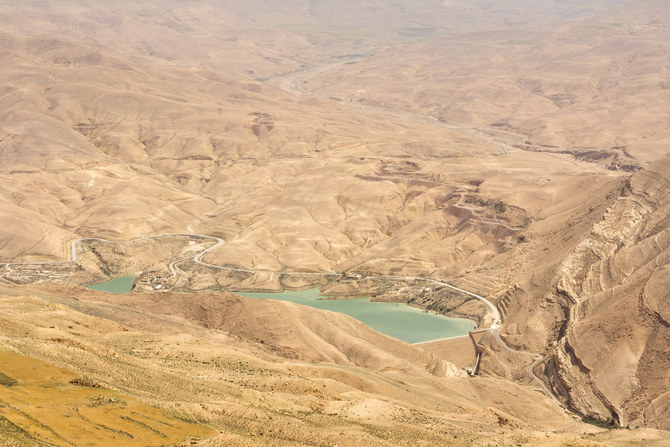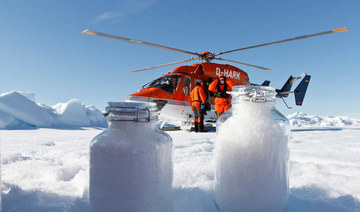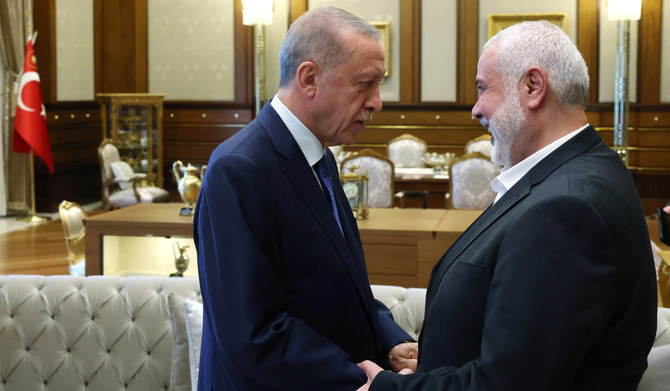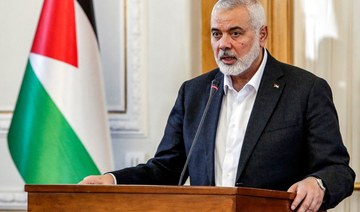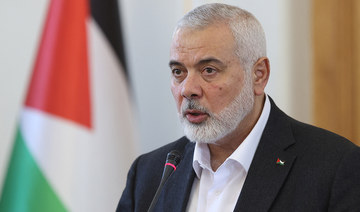DUBAI: For quite some time now, experts have been warning that water scarcity is a potential cause for conflict and migration as it increasingly threatens people, livelihoods and businesses worldwide.
Now, a report by the World Resources Institute (WRI) says 12 of the 17 most water-stressed countries in the world are located in the Middle East and North Africa (MENA).
In the WRI’s Aqueduct Water Risk Atlas, Qatar was ranked first, followed by Israel, Lebanon, Iran, Jordan, Libya, Kuwait, Saudi Arabia, the UAE, Bahrain and Oman.
The top 17 countries, including India and Pakistan, are home to a quarter of the world’s population and face “extremely high” water stress as irrigated agriculture, industries and municipalities withdraw more than 80 percent of their available supply on average every year.
The atlas ranks water stress, drought risk and flood risk across 189 countries and their subnational regions, such as states and provinces.
“Once-unthinkable water crises are becoming commonplace. The reasons for these crises go far deeper than drought,” said Rutger Hofste, an associate at Aqueduct who led the research on the WRI’s side.
“Through new hydrological models, WRI found that water withdrawals globally have more than doubled since the 1960s due to growing demand, and they show no signs of slowing down.”
Experts have been warning that water scarcity is a potential cause for conflict and migration worldwide.
In recent years, experts and civic authorities worldwide have introduced the idea of “Day Zero” — when a city government will shut off water taps for most homes and businesses — in an effort to focus attention on managing water consumption as tightly as possible.
“The region (MENA) is hot and dry, so water supply is low to begin with. But growing demands have pushed countries further into extreme stress. Climate change is set to complicate matters further,” Hofste said.
“The World Bank found that this region has the greatest expected economic losses from climate-related water scarcity, estimated at between 6 and 14 percent of GDP (gross domestic product) by 2050.”
That being said, Hofste pointed to untapped opportunities to boost water security in the region, as about 82 percent of wastewater is not reused. Harnessing this resource would generate a new source of clean water, he said.
“Leaders in treatment and reuse are already emerging: Oman, ranked 16 on our list of water-stressed countries, treats 100 percent of its collected wastewater and reuses 78 percent of it.
“About 84 percent of all wastewater collected in GCC (Gulf Cooperation Council) countries — Bahrain, Kuwait, Oman, Qatar, Saudi Arabia and the UAE — is treated to safe levels, but only 44 percent goes on to be reused.”
Water stress is just one dimension of water security. Like any challenge, its outlook depends on management, Hofste said, adding that even countries with relatively high water stress have effectively secured their water supplies through proper management.
“Saudi Arabia prices water to incentivize conservation,” he said. “Its new Qatrah (“droplet” in Arabic) Program sets water-conservation targets and aims to reduce water usage by 43 percent within the next decade.”
Experts say water scarcity is chronic in the Arab world, and will continue to increase due to limited renewable freshwater resources and shrinking available water resources — the result of overexploitation, population growth, and lack of funds to finance water infrastructure.
“The scarcity problem has been compounded by increasing frequency of drought cycles and climate change,” said Dr. Waleed Zubari, professor of water resources management at the Arabian Gulf University in Bahrain.
“These water scarcity conditions are complicated by the political dimension of shared water resources. More than half of the total renewable water resources in the Arab region originate from outside the region, without signed conventions or agreements between the riparian countries,” he added.
“That remains a leading concern threatening the region’s stability, food security and water-resources planning in concerned Arab countries.”
Zubari said Arab countries will have to cooperate politically to adopt a strategic approach and unite in support of all countries sharing water resources to ensure they have the same rights.
“It’s essential for the achievement of joint management of water resources. In this context, the establishment of the Arab Ministerial Water Council by the League of Arab States in 2009 represents an important step in this direction.”
In the GCC the issue is acute, Zubari continued. Most countries had “done well” in providing water for their ever-increasing populations and various consuming sectors. But it came at an enormous cost in terms of investments in water supply sources and infrastructure such as desalination plants, water treatment and dams, as well as consumption of groundwater at far higher rates than its replenishment by aquifers.
“GCC countries face several major challenges that are threatening water sector sustainability,” Zubari said.
“These include increasing water scarcity, increasing costs for infrastructure and service delivery, resources deterioration, and increasing environmental and economic externalities.
“The main driving forces are population growth and changing consumption patterns, lower rates of water reuse and recycling, low supply efficiency, and low energy efficiency in the water sector.”
Zubari expects their intensity to surge in the future due to climate change. “It seems inevitable if current water policies and practices continue,” he added.
“The most important regional initiative is the Arab Water Security Strategy 2010-2030, which aims at achieving major goals in development and economics, politics and institution.”
Managing water demand and allocating water resources strategically will prove crucial for the region’s future.
“Developing alternative water resources is important, especially treated wastewater — the only growing water source available,” said Hannah Wuzel, project manager at cewas Middle East, a startup program focusing on sustainable water, sanitation and resource management.
“We need to continue developing and implementing solutions in agriculture, industries, and at the domestic level that can help to reduce water usage.”
She said Gulf countries were fortunate to have the financial means to explore almost any available groundwater source, to desalinate seawater on a large scale, and to substitute water-intensive production of goods and crops with imports.
But all this is, in many ways, fundamentally unsustainable and dependent on the availability of sufficient funds.
“It certainly is an adaptation strategy,” she said. “Gulf countries invest a lot in the development of high-tech solutions for the water sector, which is a sign that there’s growing concern and awareness.”
Wuzel foresees that water will be at the top of the political and development agenda for most countries in the near future.
“The performance and development of many other sectors will be increasingly dependent on the availability and management of water,” she said.
“There’s a strong need to move beyond the traditional sector-specific conventional approach to managing water, for instance by fostering innovation and entrepreneurship that contribute with their services and products to increasing sustainability in water management.”




